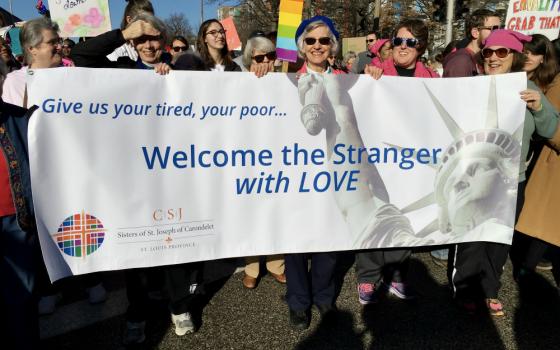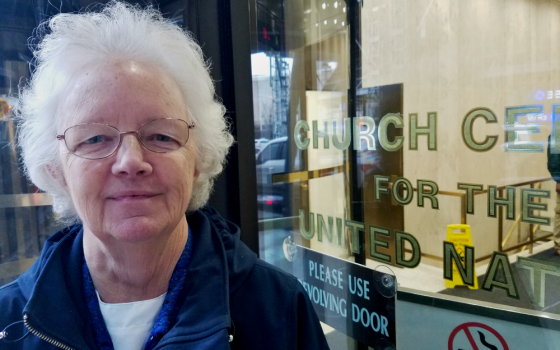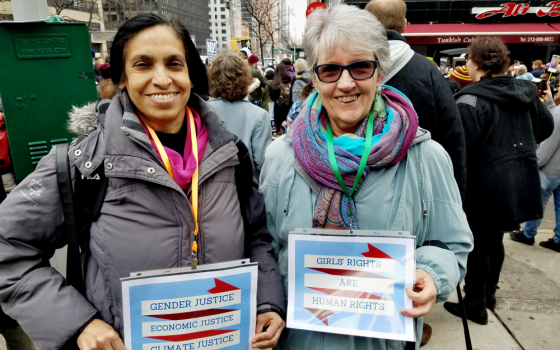Catholic sisters who joined an estimated 3 million people in Women's Marches in 500 U.S. cities on Jan. 21 said they are heartened by the large turnout, the international scope of the demonstrations, their peaceful nature, and the energy they engendered.
But the sisters said they are aware that the question of "What's next?" is a serious one and that marches cannot be standalone events. They said there has to be a long-term strategy to fight policies they and others say will prove harmful to women, to the most vulnerable and to the planet itself.
"I just don't want to go from march to march," Sr. Eileen Reilly, director of the School Sisters of Notre Dame's United Nations office, told GSR.
Maryknoll Sr. Theresa Kastner, who, like Reilly, participated in the Women's March on New York City, agreed.
"It's not enough for one day," Kastner told GSR.
Though she said more time is needed to gauge what President Donald Trump will do, Kastner said those professing a Christian faith "are being forced to live it out as we haven't in some time," particularly those who work on peace and justice concerns, such as immigrant rights.
"It's about values," said fellow Maryknoll Sr. Rosemarie Milazzo, who marched in New York City with Kastner and five other Maryknoll sisters. "If those values are threatened, we'll fight it with everything we have."
The fact that marches were held throughout the world heartened Reilly, whose work at the U.N. is focused on global concerns.
"When I saw there was a march in Latvia, that, to me, was a symbol of how widespread it was," said Reilly, who marched with Sr. Jean McLoughlin, a fellow School Sister of Notre Dame.
There was even a demonstration in Antarctica, Reilly said. "London or Paris didn't surprise me. Latvia and Antarctica did."
Reilly said there are at least two ways for those who participated in the march to continue their work, aside from being diligent about staying informed. One is to participate in other marches, such as a planned event focusing on climate change on April 29, Trump's 100th day in office, in Washington, D.C.
But marches alone are not adequate, Reilly said. They need to be supplemented, she said, by more deliberate contact with congressional representatives on issues Congress will tackle in the coming months, such as migration and health care.
Constituents should call even those representatives and senators who support positions they champion and agree with, she said.
"Push them, or congratulate them, but always contact them," she said.
The march "mobilized us and a lot of groups to follow up," said Mercy Sr. Anne Curtis, who attended the Women's March on Washington. "The follow-up is to really pay attention to what's happening, because there is so much coming at us, and to be thoughtful on how we react."
There are frequent communications that go out to Mercy members and associates about what is going on and what they can do to act, she said. One focus for U.S. sisters is what they can do locally as well as nationally. International sisters are encouraged to act in their home countries.
The worldwide rallies and international support were "astounding and really raises a sense of just how much concern there is from beyond our shores," Curtis said.
Reilly cited a new movement that former congressional staffers created, Indivisible, which aims to better connect constituents with their congressional representatives. The website centers on "best practices for making Congress listen" and replicating "the Tea Party's success in getting Congress to listen to a small, vocal, dedicated group of constituents."
Women religious are already keeping a watchful eye on the Trump administration's moves on environmental and immigration issues.
The Adrian Dominicans on Jan. 24 issued a statement reacting to his order to advance construction of the Keystone XL and Dakota Access oil pipelines. Members of the congregation "deplore the steps" Trump took, which they said "send a dangerous signal about our nation's commitment to the COP21 Climate Agreement and pose a threat to the drinking water and sacred sites of our Native American brothers and sisters."
Sr. Marilyn Winter, an Adrian Dominican, participated in an event Jan. 21 in Adrian, Michigan, that drew an estimated 150 participants, including about 30 women religious.
"It was very affirming," she said. At the event, participants held signs with positive messages promoting unity, not discord. As for what's next, she said there are a number of groups that meet on various issues, including climate change and ecumenical causes, and because many are involved in more than one organization, they feed into and support each other.
"I would hope that if we see something going on nationally and need to respond, a call would go out," she said, citing the pipeline statement as an example.
"We have to work together as women religious and committed faith-based organizations to bring out the positive," said Sr. Patricia Leonard, an Adrian Dominican who participated in the Women's March in West Palm Beach, Florida, which drew about 7,000 participants.
"I don't want us to sit back and wait for the first 100 days" of the Trump presidency, she said. "We need to be out there to counteract the negative moves."
Leonard said some might question women religious participating in the marches because Planned Parenthood was a co-sponsor, but while the sisters are against abortion, "there are all kinds of ways of being pro-life." She and other Adrian Dominicans of the Florida chapter are working to stop the death penalty in the state.
Sr. Barbara Battista of the Sisters of Providence of St. Mary-of-the-Woods, Indiana, was part of a network of administrators who organized attendees from across the state to go to the Women's March on Washington.
"It was wonderful — so energizing," she said. She was the only woman religious among the administrators, and "they were pleasantly surprised" at the level of involvement and commitment of women religious to ecological and social issues.
One of the ways to keep the energy going, she said, "is to network and get organized in our local areas." The key is to get involved in local and state politics and start focusing on midterm elections, she said.
She organized a bus that included other women religious, associates and interns at the White Violet Eco Justice Center, a ministry the Sisters of Providence at St. Mary-in-the-Woods. Several riders shared information about smartphone apps that provide easy ways to contact legislators, track bills and "connect with each other and use strategies that are more effective in moving policies forward to end systemic racism, sexism and all the other 'isms,' " she said.
She's taken to signing her emails with "March On," a statement "to keep moving," she said.
Reilly said she also believes people must engage with others with whom they disagree. She said she didn't agree with all of the sentiments expressed at the Women's March, and people of different opinions need to talk and try to understand each other.
"If we are going to go anywhere," she said, "we have to get beyond, 'I disagree with you, so I won't talk to you.' "
In her immediate family, Reilly said, 16 out of 31 people, ages 5 to 70, marched in four different cities. That was heartening, she said, and shows the alarm many people feel about "normalizing" a presidency she and others say is aligned with misogyny, racism and fear of religious minorities.
"We can't let this be normalized," she said of the Trump presidency, particularly on issues such as immigration.
The immigration issue is of particular concern to the Maryknoll sisters, as their motherhouse is in Ossining, New York, a community that has a large population of immigrants from Latin America. The sisters said they are worried about possible cutbacks to programs that receive government assistance, such as legal services for immigrants and refugees.
"We're concerned about the whole process of welcome," Milazzo said.
She said the energy of the march inspired her, and she found "joy, camaraderie and an absolute commitment to peace." But she also added a word of caution: As a veteran of mission work in the Middle East and Africa, Milazzo has "seen many Arab Springs throughout the world that have started with great enthusiasm and then died out." Staying the course, she said, requires dedication and focus.
The global response is what really impressed Sr. Jo'Ann De Quattro, a sister of the Holy Names of Jesus and Mary who traveled from Los Angeles to Washington, D.C., for the march. To keep the momentum going, she said, "we need to organize, not agonize."
[Chris Herlinger is GSR international correspondent. His email address is cherlinger@ncronline.org. Gail DeGeorge is editor of GSR. Her email address is gdegeorge@ncronline.org. Follow her on Twitter: @GailDeGeorge.]




